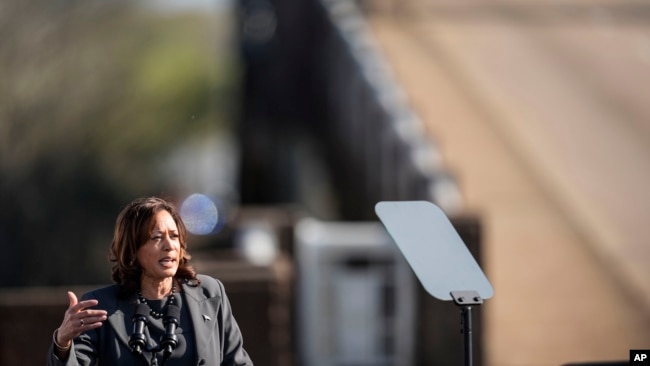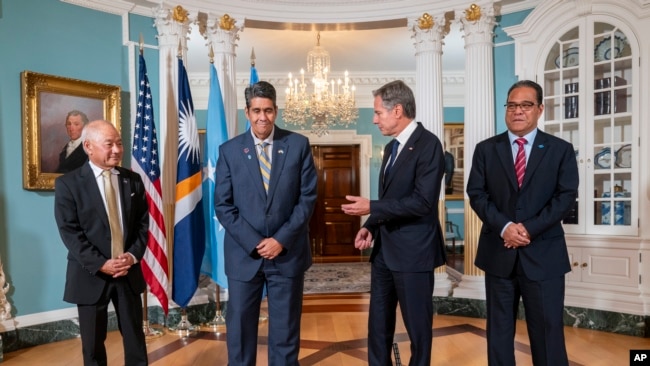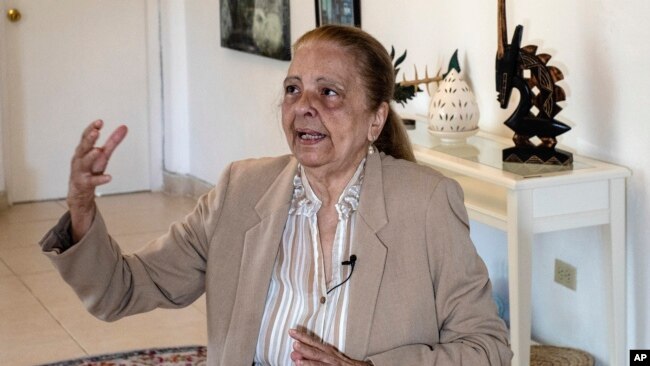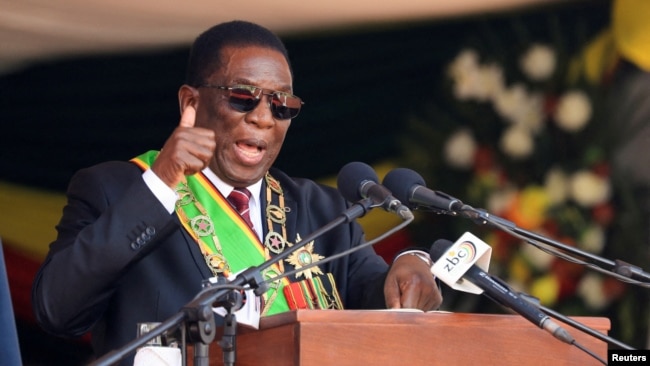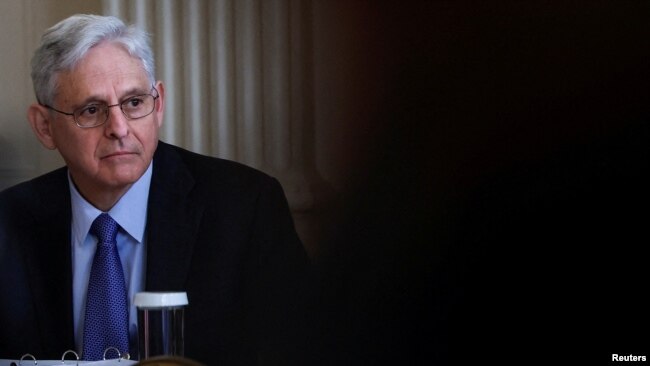'우리가 할 수 있는 일은?': 아프리카 국가의 수백만 명이 전력을 필요로 합니다
'What Can We Do?': Millions in African Countries Need Power
페이지 정보
작성자 Associated Press 작성일 23-03-25 04:35 댓글 0본문
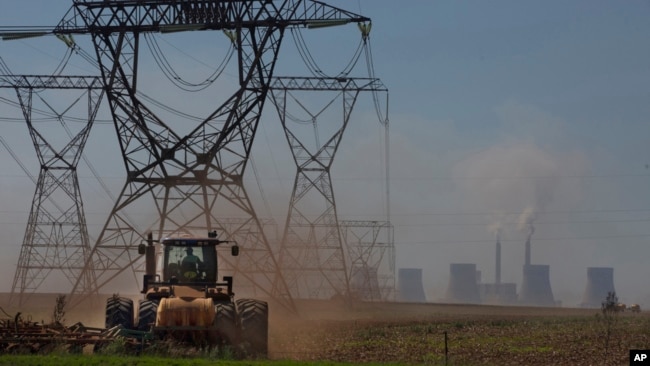
파일 - 지난 11월 남아프리카공화국 요하네스버그 동쪽 석탄발전소에서 시작된 송전탑 아래 땅이 경작되고 있습니다
FILE - The land is plowed under electrical pylons leading from a coal-powered electricity-generating plant east of Johannesburg, South Africa, on Nov. 17, 2022.
요하네스버그, 남아프리카 공화국 -
JOHANNESBURG, SOUTH AFRICA —
전력이 공급되는 유일한 시간이기 때문에 많은 사람들이 밤에 일해야 하는 짐바브웨에서부터 전력망 붕괴가 빈번한 나이지리아에 이르기까지, 아프리카 전역에서 안정적인 전력 공급은 여전히 어렵습니다.
From Zimbabwe, where many must work at night because it's the only time there is power, to Nigeria where collapses of the grid are frequent, the reliable supply of electricity remains elusive across Africa.
아프리카 54개국의 많은 나라들을 괴롭히는 전기 부족은 아프리카의 경제 성장에 심각한 고갈을 초래하고 있다고 에너지 전문가들은 경고합니다.
The electricity shortages that plague many of Africa's 54 countries are a serious drain on the continent's economic growth, energy experts warn.
최근 몇 년간 남아프리카 공화국의 발전량이 너무 부족하여 아프리카 대륙에서 가장 발달한 경제는 하루 8시간에서 10시간의 전력 공급 중단에 대처해야 합니다.
In recent years South Africa's power generation has become so inadequate that the continent's most developed economy must cope with rolling power blackouts of eight to 10 hours per day.
아프리카의 널찍한 도시들은 불규칙한 전기 공급을 하고 있지만, 아프리카 대륙의 농촌 지역의 많은 지역에는 전력이 전혀 공급되지 않습니다. 국제 에너지 기구에 따르면 2021년 아프리카인의 43%, 약 6억 명이 전기에 접근하지 못했으며, 그 중 5억 9천만 명이 사하라 이남 아프리카에 있었습니다.
Africa's sprawling cities have erratic supplies of electricity, but large swaths of the continent's rural areas have no power at all. In 2021, 43% of Africans — about 600 million people — lacked access to electricity with 590 million of them in sub‐Saharan Africa, according to the International Energy Agency.
세계은행의 추산에 따르면 사하라 이남 아프리카 전역에서 보편적인 전기화를 달성하기 위해서는 매년 거의 200억 달러의 투자가 필요합니다. 그 수치 중 거의 100억 달러가 매년 서아프리카와 중앙아프리카에서 전력을 공급하고 전력을 유지하는 데 필요합니다.
Investments of nearly $20 billion are required annually to achieve universal electrification across sub-Saharan Africa, according to World Bank estimates. Of that figure nearly $10 billion is needed annually bring power and keep it on in West and Central Africa.
요하네스버그에 있는 위트워터스랜드 대학 경영대학원의 에너지 전문가인 앤드류 로렌스에 따르면 아프리카가 전기를 끔찍하게 공급하는 데에는 노후화된 인프라, 정부의 감독 부족, 국가 전력망을 유지하기 위한 기술 부족 등 많은 이유가 있다고 합니다.
There are many reasons for Africa's dire delivery of electricity including ageing infrastructure, lack of government oversight and a shortage of skills to maintain the national grids, according to Andrew Lawrence, an energy expert at the Witwatersrand University Business School in Johannesburg.
역사적인 문제는 많은 식민지 정권이 소수 백인 인구를 위해 주로 예약된 전기 시스템을 구축하고 흑인 인구의 많은 부분을 배제했다는 것입니다.
A historical problem is that many colonial regimes built electrical systems largely reserved for the minority white population and which excluded large parts of the Black population.
오늘날 많은 아프리카 국가들은 국영 전력회사에 의존하고 있습니다.
Today many African countries rely on state-owned power utilities.
프랑스, 독일, 영국, 미국 및 유럽 연합이 가난한 나라들이 오염도가 높은 석탄 화력 발전에서 재생 가능하고 환경 친화적인 전력 공급원으로 이동하는 것을 돕기 위해 기금을 제공하고 있는 서방이 자금을 지원하는 "저스트 에너지 전환"에 지난 2년 동안 많은 관심이 집중되었습니다. 로렌스는 아프리카 대륙의 전기 접근을 확장하고 어려움을 겪고 있는 전력망을 개선하기 위해서는 아프리카 지역이 주요 수혜자 중 하나가 되어야 한다고 말했습니다.
Much attention has focused in the past two years on the Western-funded "Just Energy Transition," in which France, Germany, the United Kingdom, the United States and the European Union are offering funds to help poorer countries move from highly polluting coal-fired power generation to renewable, environmentally friendly sources of power. Africa as a region should be among the major beneficiaries in order to expand electricity access on the continent and improve the struggling power grids, said Lawrence.
"전환은 농촌 접근을 목표로 하고 대륙 전체의 전기화를 최우선으로 해야 합니다. 이것은 기술적으로 가능한 것입니다," 라고 그가 말했습니다.
"The transition should target rural access and place at the forefront the electrification of the continent as a whole. This is something that is technically possible," he said.
서방 강대국들은 남아프리카 공화국이 국가 전력의 80%를 생산하는 석탄 화력 발전소에서 멀어지는 것을 돕기 위해 85억 달러를 사용할 수 있도록 하겠다고 맹세했습니다.
The Western powers vowed to make $8.5 billion available to help South Africa move away from its coal-fired power plants, which produce 80% of the country's power.
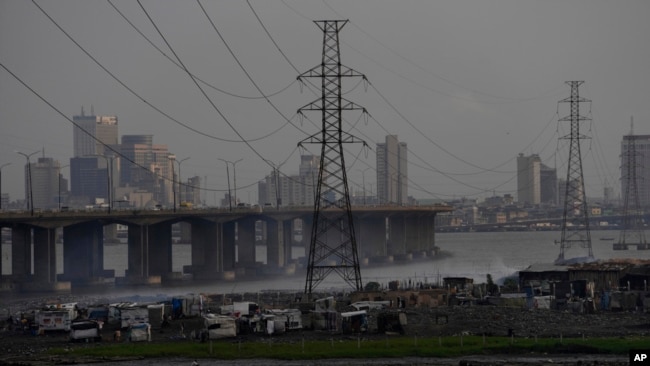
파일 - 고압 전력선이 나이지리아 라고스의 마코코 슬럼을 통과합니다
FILE - High-tension power lines pass through Makoko slum in Lagos, Nigeria, Aug. 20, 2022.
전문가들에 따르면, 석탄에 의존한 결과, 남아프리카 공화국은 세계에서 가장 높은 온실 가스 배출국 20위 안에 들고 아프리카 전체 배출량의 거의 3분의 1을 차지한다고 합니다.
As a result of its dependence upon coal, South Africa is among the top 20 highest emitters of planet-warming greenhouse gases in the world and accounts for nearly a third of all of Africa's emissions, according to experts.
그러나 석탄에서 멀어지려는 남아프리카 공화국의 계획은 매일 가능한 한 많은 전력을 생산해야 하는 절박한 필요성 때문에 방해를 받고 있습니다.
South Africa's plan to move away from coal, however, is hampered by its pressing need to produce as much power as possible each day.
동아프리카 국가인 우간다도 전력 생산에 대한 대규모 투자에도 불구하고 수년간 전력 공급 중단과 씨름해 왔습니다.
The East African nation of Uganda for years has also grappled with power cuts despite massive investment in electricity generation.
아프리카에서 가장 인구가 많은 나라인 나이지리아는 2억 1천만 명 이상의 인구가 30,000 메가와트를 필요로 하지만 단 4,000 메가와트만을 생산하면서 수년간 부족한 전력 공급과 씨름해 왔다고 전문가들은 말합니다. 석유가 풍부하지만 에너지가 부족한 서아프리카 국가는 전력 부문에 대한 투자를 늘렸지만 고질적인 부패와 잘못된 관리는 거의 이득이 되지 않았습니다.
Nigeria, Africa's most populous country, has grappled with an inadequate power supply for many years, generating just 4,000 megawatts though the population of more than 210 million people needs 30,000 megawatts, say experts. The oil-rich but energy-poor West African nation has ramped up investments in the power sector but endemic corruption and mismanagement have resulted in little gains.
짐바브웨에서 가장 큰 댐인 카리바를 관리하는 국가 당국이 낮은 수위 때문에 발전량이 제한되면서 수년간 나라를 괴롭혀온 전력난이 악화됐습니다.
In Zimbabwe, electricity shortages that have plagued the country for years have worsened as the state authority that manages Kariba, the country's biggest dam, has limited power generation due to low water levels.
연이은 가뭄으로 카리바 호수의 수위가 너무 낮아져 짐바브웨 전력의 약 70%를 공급하는 카리바 남부 수력발전소는 현재 용량 1,050메가와트에 훨씬 못 미치는 300메가와트만 생산하고 있습니다.
Successive droughts have reduced Lake Kariba's level so much that the Kariba South Hydro Power Station, which provides Zimbabwe with about 70% of its electricity, is currently producing just 300 megawatts, far less than its capacity of 1,050 megawatts.
일부 전기를 공급하는 짐바브웨의 석탄 화력 발전소는 잦은 고장으로 특징지어지는 노후화된 인프라 때문에 신뢰할 수 없게 되었습니다. 그 나라의 태양열 잠재력은 아직 공급을 의미 있게 증가시키기 위해 완전히 개발되지 않았습니다.
Zimbabwe's coal-fired power stations that also provide some electricity have become unreliable due to aging infrastructure marked by frequent breakdowns. The country's solar potential is yet to be fully developed to meaningfully augment supply.
이것은 Harare 이발사 Omar Chienda가 언제 전기 클리퍼를 작동시키는 데 필요한 전력을 갖게 될지 모른다는 것을 의미합니다.
This means that Harare barber Omar Chienda never knows when he'll have the power needed to run his electric clippers.
우리가 무엇을 할 수 있습니까? 세 아이의 아버지인 치엔다(39)는 "전기가 돌아올 때까지 기다려야 하지만 대부분 밤에 전기가 들어온다"며 "이는 일을 할 수 없다는 것을 의미하며 가족들은 굶주리고 있습니다"라고 말했습니다.“
"What can we do? We just have to wait until electricity is back but most of the time it comes back at night," said Chienda, a 39-year-old father of three. "That means I can't work, my family goes hungry."
나이지리아의 수도 아부자에서 식당 주인인 29세의 Favor Ben은 매달 예산의 상당 부분을 전기 요금과 발전기의 휘발유에 쓰지만 매일 평균 7시간의 전력만을 받는다고 덧붙였습니다.
In Nigeria's capital city of Abuja, restaurant owner Favour Ben, 29, said she spends a large part of her monthly budget on electricity bills and on petrol for her generator, but adds that she gets only an average of seven hours of power daily.
"특히 전기 요금을 지불한 후에는 빛이 들어오지 않습니다."라고 벤이 말했습니다. "대부분의 경우 손님들의 주문을 준비하는데 (냉장고를 위한) 불이 없으면 다음날 (그리고) 돈을 잃습니다."
"It has been very difficult, especially after paying your electricity bill and they don't give you light." said Ben. "Most times, I prepare customers' orders but if there is no light (power for a refrigerator), it turns bad the next day (and) I have lost money for that."
나이지리아의 기업들은 신뢰할 수 없는 전기로 인해 연간 290억 달러의 손실을 입었다고 세계은행은 말했습니다. 필수 서비스 제공업체들은 종종 발전기에서 운영을 유지하기 위해 고군분투하고 있습니다.
Businesses in Nigeria suffer an annual loss of $29 billion as a result of unreliable electricity, the World Bank said, with providers of essential services often struggling to keep their operations afloat on generators.
이달 아프리카의 에너지 문제를 논의하기 위해 케이프타운에 모인 대표단들은 아프리카 대륙의 장기화된 전력 부족을 시급히 해결해야 한다는 공감대를 형성했습니다. 서구가 자금을 지원하는 "Just Energy Transition"이 일부 기회를 창출할 것이라는 희망이 있었지만, 많은 사람들은 회의적이었습니다.
As delegates gathered in Cape Town this month to discuss Africa's energy challenges, there was a resounding sentiment that drawn-out power shortages on the continent had to be addressed urgently. There was some hope that the Western-funded "Just Energy Transition" would create some opportunities, but many remained skeptical.
남아프리카 공화국과 같은 국가들이 석탄 사용에서 더 깨끗한 에너지로 빠르게 전환하도록 하려는 노력에 대한 가장 큰 비판자 중 한 명은 남아프리카의 광물 자원 및 에너지 장관 그웨데 만타셰입니다.
Among the biggest critics of efforts to have countries like South Africa to transition quickly from the use of coal to cleaner energy is South Africa's Minister of Mineral Resources and Energy Gwede Mantashe.
그는 아프리카가 천연 가스, 태양열, 풍력, 수력, 특히 석탄을 포함한 대륙에 적합한 전력을 생산하기 위해 이용 가능한 모든 자원을 사용할 것을 옹호하는 사람들 중 한 명입니다.
He is among those advocating that Africa use all sources available to it to produce adequate power for the continent, including natural gas, solar, wind, hydropower and especially coal.
"석탄은 앞으로 수년간 우리와 함께 할 것입니다. 그것을 부패 또는 무엇이든 가는 길로 보는 사람들은 수년간 실망할 것입니다."라고 Mantash는 말했습니다. "석탄은 우리 중 많은 사람들보다 오래 살 것입니다."
"Coal will be with us for many years to come. Those who see it as corruption or a road to whatever, they are going to be disappointed for many, many years," said Mantashe. "Coal is going to outlive many of us."
출처 : VOANews
댓글목록 0
등록된 댓글이 없습니다.


